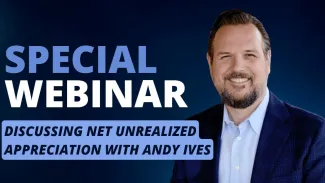
Special Webinar Series: Discussing Net Unrealized Appreciation with Andy Ives
In this special episode, Mark has a nuanced conversation about inherited IRAs and net unrealized appreciation with Andy Ives from the Ed Slott Group.
They begin the discussion with Andy sharing what he believes you can expect in the near future due to the updates being made to the SECURE Act, or the SECURE Act 2.0 as some people are referring to it. One of the big changes that is rumored to be coming is a further increase in the RMD age – it started at 70 ½ years of age, went to 72 years old, and is now potentially changing to 75 years. There are also changes potentially being made as far as how certain trusts work, but it’s hard to know for sure what changes will make it through legislation and which will be left behind. Mostly, Mark and Andy focus on the potential raising of RMDs and how that could impact your retirement planning – especially if the RMD is one day completely absolved.
The conversation transitions to a discussion about the 10-year rule and the eradication of the stretch IRA. For those who don’t know, the 10-year rule basically says that beneficiaries have to withdraw all funds from an inherited IRA by December 31st of the 10th year after the original owner’s death. While there are some people who don’t have to abide by this rule, for the most part, beneficiaries have to work within that 10-year time limit when it comes to dealing with an inherited IRA. Mark and Andy have a more in-depth conversation about how a minor could navigate an inherited IRA as well as the 10-year rule that would go into effect once they reached legal age.
Taking Advantage of the Net Unrealized Appreciation Strategy
As the conversation continues, the men turn to a discussion on net unrealized appreciation using a client of Mark’s who missed out on taking advantage of this benefit and ultimately lost tens of thousands of dollars to taxes. Mark explains how often people miss out on the benefits of net unrealized appreciation and how it’s not something that can be undone so it’s important to understand what net unrealized appreciation is and how it works. Andy argues that while it doesn’t make sense for everyone, any time you’re going to start a rollover, it’s important to ask about net unrealized appreciation first. For some employees, their employer offers the benefit of allowing the employee to own stock in the company. Andy defines net unrealized appreciation as the difference between the original cost basis and the current market value of shares of employer stock.
This becomes significant if you’re distributing highly appreciated employer stock from your tax-deferred retirement account, such as a 401k. So, if you have a solid amount of money in company stock in your 401k and don’t pursue the net unrealized appreciation strategy but instead, take your money out or roll it over into an IRA, you’ll end up paying ordinary income tax on all of that money. However, the net unrealized appreciation strategy allows you to pay ordinary income only on the basis of the stock and then capital gains on the growth, ultimately helping you save money on taxes.
Tune in to learn more about net unrealized appreciation and how you can potentially save thousands on your taxes in the future.
Visit our website: https://attleborowealt.wpengine.com
Schedule a meeting with Mark at: admin@attleborowealth.com
The opinions expressed in this program are for general informational purposes only and are not intended to provide specific advice or recommendations for any individual or on any specific security. It is only intended to provide education about the financial industry. To determine which investments may be appropriate for you, consult your financial advisor prior to investing. Any past performance discussed during this program is no guarantee of future results. Any indices referenced for comparison are unmanaged and cannot be invested into directly.
As always please remember investing involves risk and possible loss of principal capital; please seek advice from a licensed professional. Attleboro Wealth Management, LLC is a Registered Investment Adviser. This program is solely for informational purposes. Advisory services are only offered to clients or prospective clients where Attleboro Wealth Management, LLC and its representatives are properly licensed or exempt from licensure. Past performance is no guarantee of future returns. Investing involves risk and possible loss of principal capital. No advice may be rendered by Attleboro Wealth Management, LLC unless a client service agreement is in place.

